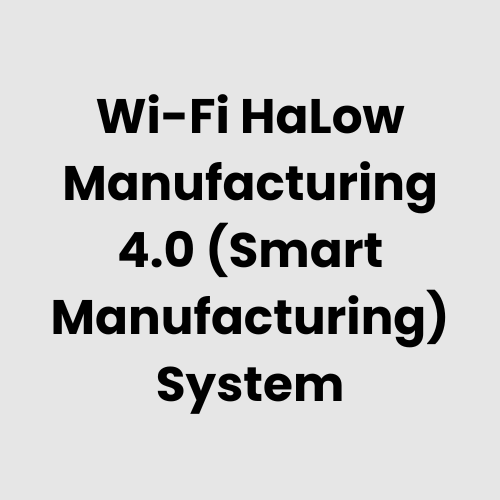Description
Wi-Fi HaLow Enabled Manufacturing 4.0 (Smart Manufacturing) System: Technical Architecture
The Wi-Fi HaLow Enabled Manufacturing 4.0 (Smart Manufacturing) System integrates advanced IoT technology with Wi-Fi HaLow (IEEE 802.11ah) connectivity to facilitate real-time monitoring, data exchange, and enhanced automation in manufacturing environments. Designed to optimize processes, improve production efficiency, and enable predictive maintenance, this system is integral to Industry 4.0 transformations in modern manufacturing.
The technical architecture of this system comprises several essential layers:
- Connectivity Layer: At the core of the architecture is Wi-Fi HaLow, offering long-range and low-power communication suitable for factory floors and large industrial environments. This technology ensures robust and reliable data transmission from edge devices to centralized systems.
- Edge Device Layer: The edge layer includes IoT-enabled devices such as sensors, actuators, machines, and robots. These devices capture real-time data on production status, machine health, environmental conditions, and other operational metrics, essential for smart manufacturing.
- Data Acquisition and Processing Layer: Data gathered by the sensors and devices is collected and transmitted to local servers or edge devices for immediate analysis. This enables real-time decision-making and action, such as adjusting machinery, optimizing production lines, or preventing equipment failure.
- Cloud Integration Layer: For deeper analysis and long-term storage, data is transferred to a cloud platform. The cloud provides scalability, data storage, and advanced analytics tools such as machine learning models and predictive algorithms.
- Data Analytics and Visualization Layer: Advanced data analytics and visualization tools in the cloud platform allow manufacturing managers to assess production performance, track KPIs, and optimize operational processes using intuitive dashboards and interactive reports.
- Security Layer: Given the critical nature of manufacturing systems, robust security protocols, including encryption, authentication, and secure data transmission, are implemented at every layer to protect sensitive production and operational data.
Hardware Components of the Wi-Fi HaLow Enabled Manufacturing 4.0 (Smart Manufacturing) System
The hardware for the Wi-Fi HaLow Enabled Manufacturing 4.0 System is designed for rugged industrial environments and includes the following key components:
- Wi-Fi HaLow Routers and Gateways: These devices are critical for providing reliable, long-range communication across factory floors and connecting IoT-enabled devices and sensors to the central data processing system.
- IoT Sensors and Actuators: This includes a wide variety of sensors used for monitoring temperature, humidity, pressure, vibration, motion, and other environmental or operational parameters in manufacturing processes. Actuators control machines and equipment based on the data received from sensors.
- Smart Machines and Robots: These devices are embedded with IoT sensors and connectivity features that enable automation and remote control. They are integral to the smart manufacturing process, allowing for autonomous operation, monitoring, and maintenance.
- Edge Devices: Edge computing devices are placed close to the sensors to process data locally before sending it to the cloud or central systems. These devices reduce latency and enable real-time decision-making for time-sensitive manufacturing tasks.
- Local Servers: These servers provide additional processing power and data storage for local operations, enabling real-time analytics, control, and monitoring of factory equipment and machines.
- Power Management Devices: Power supplies, backup batteries, and energy management devices are crucial for ensuring that critical systems remain operational in industrial environments.
Physical Placement Considerations of the Hardware
When deploying the Wi-Fi HaLow Enabled Manufacturing 4.0 System, proper placement of hardware is essential to maximize coverage, data collection, and overall system efficiency:
- Router and Gateway Placement: Wi-Fi HaLow routers and gateways should be strategically placed at key points across the factory floor to ensure consistent coverage and reliable data transmission from remote sensors and machines. Consideration must be given to factory layouts and obstacles that could interfere with signal strength.
- Sensor Placement: Sensors must be positioned where they can effectively monitor the processes they are tracking, such as attaching temperature or pressure sensors to critical machinery. Environmental sensors should be placed to monitor ambient conditions in manufacturing spaces.
- Edge Devices Placement: Edge computing devices should be installed near the data collection points to process data locally and reduce transmission delays. These devices are typically housed in protective enclosures to shield them from dust, moisture, and other factory hazards.
- Smart Machines and Robots Placement: Smart machines and robots need to be positioned where they can perform their tasks autonomously or with minimal human intervention. This includes assembly lines, loading zones, or quality control areas.
- Power Management Systems: Power management systems, including backup power supplies, should be installed in centralized locations to ensure that power is distributed evenly across critical systems, providing uninterrupted operation during factory shifts.
Hardware Architecture of the Wi-Fi HaLow Enabled Manufacturing 4.0 (Smart Manufacturing) System
The hardware architecture of the system follows a layered approach to ensure seamless communication and data processing. The architecture consists of:
- Wi-Fi HaLow Network: The backbone of the system, enabling wireless communication across long distances with low power consumption.
- IoT Devices and Sensors: These provide real-time data from factory equipment, machines, environmental factors, and operational parameters. Sensors monitor temperature, humidity, pressure, machine vibrations, and more.
- Edge Computing Nodes: These local devices process data close to the point of collection to reduce latency and improve operational efficiency. They act as intermediaries between the sensors and the cloud.
- Local Servers and Data Storage: Local servers manage real-time data and support critical operations, including analytics, monitoring, and process control.
- Cloud Platform: The cloud is used for scalable data storage, advanced analytics, and integration with other enterprise systems like ERP, MES, and SCM for broader business intelligence and operational optimization.
- Smart Manufacturing Equipment: IoT-enabled machines, robots, and actuators are central to automating and optimizing the manufacturing process. These devices can self-monitor, self-adjust, and communicate with each other for synchronized operations.
Deployment Considerations of the Wi-Fi HaLow Enabled Manufacturing 4.0 (Smart Manufacturing) System
For the successful deployment of the Wi-Fi HaLow Enabled Manufacturing 4.0 System, several considerations must be accounted for:
- Factory Layout and Network Design: A detailed site survey and factory layout analysis are essential to determine the optimal placement of routers, gateways, and IoT devices. The layout should ensure complete network coverage and efficient data transmission across the entire production floor.
- Scalability and Flexibility: The system should be deployed with scalability in mind, allowing for the easy addition of new devices, sensors, or machines as production grows or new requirements emerge.
- Integration with Existing Systems: The Wi-Fi HaLow system must integrate seamlessly with legacy manufacturing systems, such as PLCs, MES, and ERP systems, to ensure compatibility and smooth data flow.
- Security Measures: As manufacturing data is critical, the system should implement robust security protocols such as encrypted data transmission, secure access control, and intrusion detection mechanisms to protect sensitive information.
- Maintenance and Support: GAO Tek offers expert support both remotely and onsite to ensure smooth operation and troubleshooting during and after deployment. Regular maintenance, software updates, and system optimizations should be scheduled to ensure continuous operation.
List of Relevant Industry Standards and Regulations
- IEEE 802.11ah (Wi-Fi HaLow Standard)
- International Organization for Standardization (ISO) 9001
- National Institute of Standards and Technology (NIST) Cybersecurity Framework
- General Data Protection Regulation (GDPR)
- Industrial Internet Consortium (IIC) Standards
- International Electrotechnical Commission (IEC) 61508
- ISO/IEC 27001 (Information Security Management)
- Open Platform Communications (OPC) Unified Architecture (UA) for Industrial Automation
Local Server Version: Running with a Local Server
For certain manufacturing environments, a local server-based deployment may be preferred. This version involves setting up local servers to handle data processing and storage on-site:
- Local Data Processing: Data from the IoT sensors and devices is processed in real-time at the factory floor, allowing for immediate action without the need for cloud communication. This is especially useful for time-sensitive decisions, such as machine optimization or predictive maintenance.
- On-Premises Storage: Sensitive operational data can be stored securely on local servers, ensuring that critical information stays within the organization’s premises, minimizing risks related to data breaches or privacy concerns.
- Customizable Infrastructure: Local servers can be tailored to meet the specific needs of the facility, supporting specific manufacturing requirements, whether for high-performance computing or large-scale data storage.
Cloud Integration and Data Management
The Wi-Fi HaLow Enabled Manufacturing 4.0 System seamlessly integrates with cloud platforms to maximize the value of real-time data:
- Cloud Storage and Scalability: The cloud allows for the flexible storage of large volumes of manufacturing data, making it easy to scale as production grows and new devices are added to the network.
- Advanced Analytics: Cloud platforms provide powerful data analytics tools, including machine learning algorithms, to analyze production trends, monitor machine health, and predict failures before they happen. These tools enable more efficient resource management and increased uptime.
- Seamless Integration: The cloud connects the system with other enterprise solutions, including ERP, MES, and SCM systems, providing a unified platform for monitoring and improving the entire manufacturing process.
- Data Security: Cloud platforms ensure that all data is encrypted and securely stored, with frequent backups and compliance with relevant industry regulations to protect sensitive manufacturing data.
GAO Case Studies of Manufacturing 4.0 (Smart Manufacturing)
USA Case Studies
- Detroit, Michigan: A Detroit-based automotive manufacturer integrated IoT sensors and real-time monitoring to optimize assembly lines, reducing downtime by 30%. GAO Tek provides smart manufacturing solutions that enhance operational efficiency. Explore IoT in manufacturing.
- Houston, Texas: A chemical plant in Houston adopted predictive maintenance powered by edge computing to reduce equipment failures. GAO Tek’s systems help industries prevent costly unplanned maintenance. Discover predictive maintenance tools.
- Chicago, Illinois: A food processing facility in Chicago deployed AI-driven quality control systems to enhance product consistency. GAO Tek supports such advancements with robust AI-integrated technologies. Learn about AI in quality control.
- Pittsburgh, Pennsylvania: A steel manufacturer in Pittsburgh implemented digital twins to simulate production scenarios and improve resource utilization. GAO Tek offers cutting-edge tools for digital twin technology. Understand digital twins in manufacturing.
- San Jose, California: An electronics manufacturer in San Jose automated inventory tracking with RFID-based systems, reducing errors significantly. GAO Tek provides scalable RFID solutions tailored to smart manufacturing needs. Explore RFID for inventory management.
- Charlotte, North Carolina: In Charlotte, a heavy machinery manufacturer utilized IoT platforms to monitor real-time energy consumption, achieving a 25% reduction in energy costs. GAO Tek’s IoT systems help industries meet energy efficiency goals. Learn about IoT for energy optimization.
- Atlanta, Georgia: A packaging company in Atlanta embraced robotic automation to streamline workflows, increasing productivity by 40%. GAO Tek assists businesses in integrating robotics into their manufacturing processes. Explore robotics in manufacturing.
- Cleveland, Ohio: A metal fabrication plant in Cleveland introduced AI-based demand forecasting tools to enhance supply chain management. GAO Tek supports predictive analytics for smarter supply chains. Discover AI for supply chain optimization.
- Phoenix, Arizona: A semiconductor manufacturer in Phoenix leveraged machine learning to improve yield rates. GAO Tek provides tailored machine learning solutions for advanced manufacturing. Learn about machine learning in manufacturing.
- Boston, Massachusetts: A pharmaceutical facility in Boston integrated IoT-enabled environmental monitoring to maintain regulatory compliance. GAO Tek offers solutions to ensure precise monitoring in highly regulated industries. Explore IoT for compliance monitoring.
- Dallas, Texas: A textile manufacturer in Dallas digitized its workflow with smart sensors, boosting efficiency by 20%. GAO Tek provides expertise in implementing smart sensor systems. Learn about smart sensors in manufacturing.
- Seattle, Washington: A beverage production plant in Seattle utilized blockchain to enhance traceability in its supply chain. GAO Tek delivers blockchain-based solutions for transparent manufacturing processes. Understand blockchain for supply chains.
- Raleigh, North Carolina: An HVAC manufacturer in Raleigh adopted additive manufacturing for rapid prototyping, reducing development cycles. GAO Tek’s technologies support innovation through 3D printing and related advancements. Discover 3D printing in manufacturing.
- Indianapolis, Indiana: In Indianapolis, a pharmaceutical company employed AR-based training for new workers, reducing onboarding time by half. GAO Tek’s expertise in AR solutions accelerates workforce readiness. Learn about AR for training.
- Minneapolis, Minnesota: A medical device manufacturer in Minneapolis implemented real-time tracking of production metrics, ensuring faster issue resolution. GAO Tek provides integrated systems for seamless monitoring and analytics. Explore real-time tracking solutions.
Canada Case Studies
- Toronto, Ontario: In Toronto, an aerospace manufacturer utilized AI-driven defect detection systems to enhance product quality. GAO Tek’s solutions empower manufacturers to achieve unparalleled quality assurance standards. Learn about AI for quality assurance.
- Montreal, Quebec: A plastics manufacturer in Montreal deployed IoT-connected machinery to optimize resource use and reduce waste by 15%. GAO Tek delivers IoT systems that support sustainable manufacturing practices. Explore IoT for sustainable manufacturing.
Navigation menu for Wi-Fi HaLow
- Wi-Fi HaLow Gateways/Routers
- Wi-Fi HaLow End Devices
- Wi-Fi Halow – Cloud, Server, PC & Mobile Systems
- Wi-Fi HaLow Accessories
Navigation Menu for IoT
- LORAWAN
- Wi-Fi HaLow
- Z-WAVE
- BLE & RFID
- NB-IOT
- CELLULAR IOT
- GPS IOT
- IOT SENSORS
- EDGE COMPUTING
- IOT SYSTEMS
Our products are in stock and can be shipped anywhere in the continental U.S. or Canada from our local warehouse. For any further information, please fill out this form or email us.
We are looking for partners. For more information on partnering with GAO, please visit Partner with GAO Tek Inc. It lists various ways to partner with GAO, such as OEM Partnerships, Technology Integration, Distribution and Reselling Opportunities, Presenting at the Leading Event TekSummit, Joint R&D Projects, Training and Consulting Services, Industry-Specific Collaborations, Research and Academic Partnerships.



